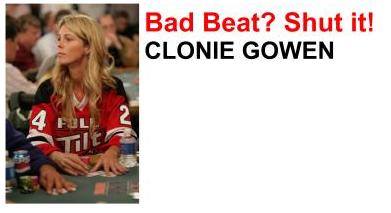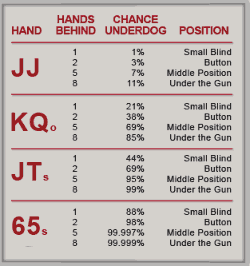Clonie Gowen: Bad Beat? Shut it!
 I played a tournament at a local casino a few weeks back. I had Q-Q, K-K and A-K(s) early in the tournament to accumulate a sizable chip lead. Then I picked up A-A and flopped a set, only to get rivered by a straight against the only player at the table who could cripple me. I ended up busting out shortly after that. I walked away so angry that I didn’t want to speak or talk to anyone, yet I would tell my story to anyone who listened. I felt like I didn’t want to stop playing poker, so I went to play a cash game where I lost, and lost big. What do you do when you suffer a bad beat?
I played a tournament at a local casino a few weeks back. I had Q-Q, K-K and A-K(s) early in the tournament to accumulate a sizable chip lead. Then I picked up A-A and flopped a set, only to get rivered by a straight against the only player at the table who could cripple me. I ended up busting out shortly after that. I walked away so angry that I didn’t want to speak or talk to anyone, yet I would tell my story to anyone who listened. I felt like I didn’t want to stop playing poker, so I went to play a cash game where I lost, and lost big. What do you do when you suffer a bad beat?
 I believe that one of the key ingredients to any player’s game is the ability to put bad beats behind him, and the only way to do that is not to talk about it – to anyone. You should always analyse your play to make sure you played the hand correctly, but to dwell on the bad beat itself is self destructive.
I believe that one of the key ingredients to any player’s game is the ability to put bad beats behind him, and the only way to do that is not to talk about it – to anyone. You should always analyse your play to make sure you played the hand correctly, but to dwell on the bad beat itself is self destructive.
I never play cash games after busting out of a tournament, whether I suffered a bad beat or not. I know that my mind is still in tournament mode, and I am still thinking about how I might have avoided certain situation for the future.
If I see players who just busted out of a tournament sit down at a cash game, I will make my way to their table. I can easily get into their minds, and will put them on tilt just by asking one simple question: What happened in the tournament today? They will either launch into a horrible bad beat story or rant about the lucky idiot they just played against. When I hear this, I know they have other things on their minds than the game at hand, so will misplay hands and give off more tells because they aren’t focused enough on the game they are playing.
If you can keep control of your mind and your emotions, you will think more rationally and feel better about yourself, and that will give you a better chance of winning. It is so important to have a clear head when you play poker. This requires your mind not to be overloaded with problems from home and not to be on the bad beat you took. Focus on what you can control, which is how you deal with problems at the table or away. Once you sit down at the poker table, it’s time to go to work. At work there will be problems, someone will make a horrible call and get lucky. You can’t let that keep you from the rest of the work at hand. If you do, you will miss key opportunities to pick p chips.
This is so important when you are not catching cards. You will need to have your mind clear enough to notice the guy in seat 4 is reraising with small pots, while the guy in seat 1 just said that he won his seat online for $3, and that the $10,000 cash will be a nice return on his investment. I believe in the power of positive thinking, so I rarely allow my self to dwell on things I cannot control. I let it go; try to see it as a learning experience; then I win. You have two choices in life: you can choose to be happy or you can choose to be mad. Either way, we can’t do anything to change the way the cards have fallen. But you can choose to avoid situations where you stand to lose a lot more money because you are not focused.
Clonie
 There’s lots of choice when it comes to poker networks including the iPoker Network, Microgaming Poker, Chico Poker and WPN Poker Networks. Check out the latest poker room reviews before you decide where to play your next hand of poker.
There’s lots of choice when it comes to poker networks including the iPoker Network, Microgaming Poker, Chico Poker and WPN Poker Networks. Check out the latest poker room reviews before you decide where to play your next hand of poker.
 This Cheat Sheet is a great starting point for Texas Hold’em newbies. It shows some hands are playable in all positions, and some in late position only. Why? Without getting into the mathematics, imagine it this way. When you are in first position (under the gun ot utg), this means that before the flop, you are acting first. You have no idea what the people behind you were dealt, so your hand needs to be strong enough to be able to play against what will effectively be the best hand/hands out of the remaining players.
This Cheat Sheet is a great starting point for Texas Hold’em newbies. It shows some hands are playable in all positions, and some in late position only. Why? Without getting into the mathematics, imagine it this way. When you are in first position (under the gun ot utg), this means that before the flop, you are acting first. You have no idea what the people behind you were dealt, so your hand needs to be strong enough to be able to play against what will effectively be the best hand/hands out of the remaining players.

 I was in the small blind with King-Jack suited. It was folded to Chris Ferguson who had about 70K to start the hand. He raised it to 3,000. I decided I could probably pick it up with a little re-raise, take him off of Ace-rag or a small pair. He thought for a little bit and called. I put him on a very strong hand here. He’s not likely to defend his button raise with a weak hand. I’d been playing pretty tight.
I was in the small blind with King-Jack suited. It was folded to Chris Ferguson who had about 70K to start the hand. He raised it to 3,000. I decided I could probably pick it up with a little re-raise, take him off of Ace-rag or a small pair. He thought for a little bit and called. I put him on a very strong hand here. He’s not likely to defend his button raise with a weak hand. I’d been playing pretty tight. The best players have the ability to acknowledge and learn from their mistakes – it’s one of the qualities that make them so good. John D’Agostino noted, “When you listen to the general public you hear, ‘I got so unlucky.’ Generally, all you hear the pros talk about is how they played a hand poorly. We understand we make mistakes and we try to get better from them.”
The best players have the ability to acknowledge and learn from their mistakes – it’s one of the qualities that make them so good. John D’Agostino noted, “When you listen to the general public you hear, ‘I got so unlucky.’ Generally, all you hear the pros talk about is how they played a hand poorly. We understand we make mistakes and we try to get better from them.” Chris Ferguson noted that humility is vital to winning poker. “To improve, you have to know you’re making mistakes,” Ferguson said. “There are a lot of hands I don’t know how to play. There are a lot of situations I don’t know how to handle. If I thought I knew everything, I’d never improve.”
Chris Ferguson noted that humility is vital to winning poker. “To improve, you have to know you’re making mistakes,” Ferguson said. “There are a lot of hands I don’t know how to play. There are a lot of situations I don’t know how to handle. If I thought I knew everything, I’d never improve.” Howard Lederer says, “To become a pro or a really good player, you have to become brutally objective about your game. If you aren’t, you won’t make the changes and improvements you need.”
Howard Lederer says, “To become a pro or a really good player, you have to become brutally objective about your game. If you aren’t, you won’t make the changes and improvements you need.”




